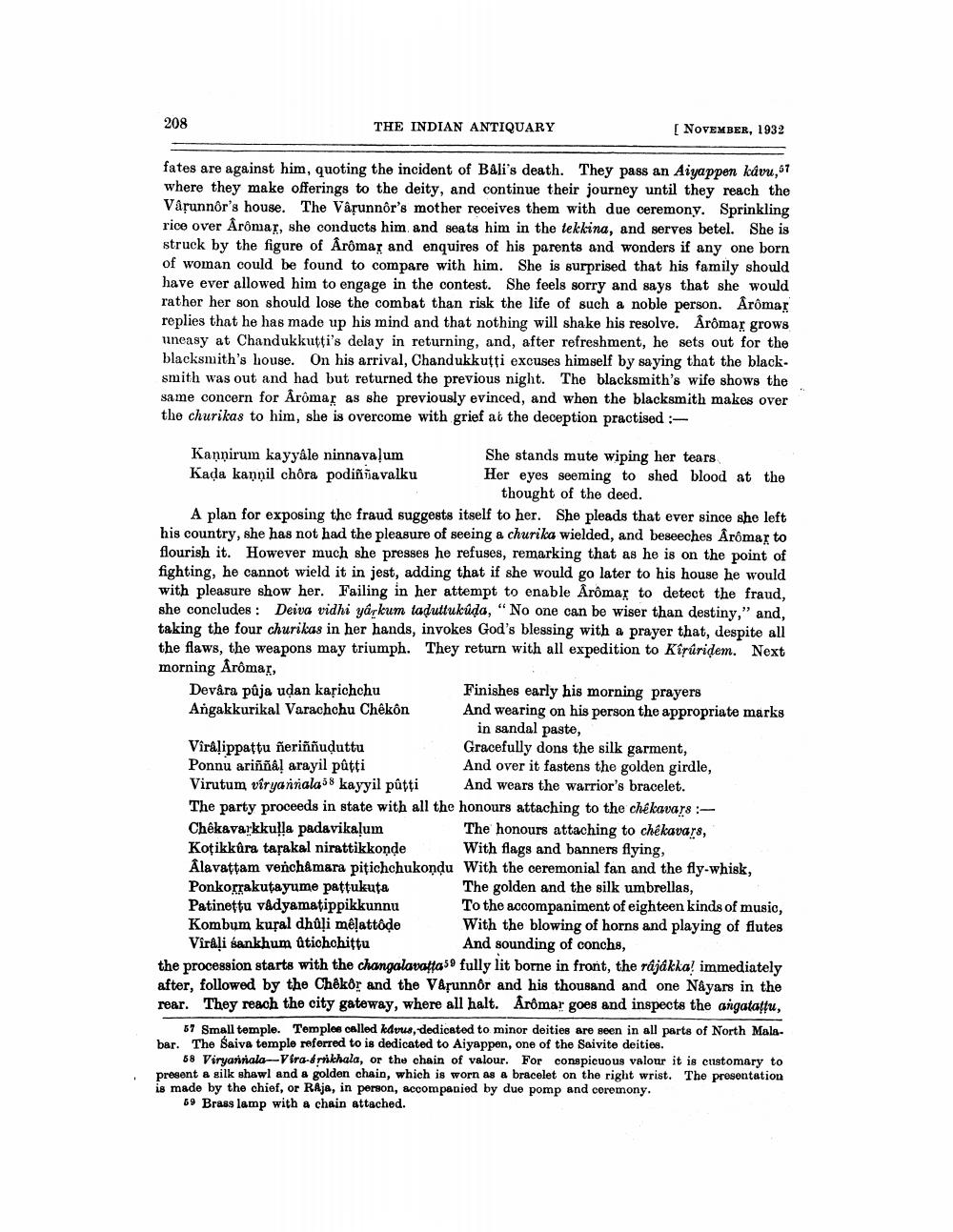________________
208
THE INDIAN ANTIQUARY
[ NOVEMBER, 1932
fates are against him, quoting the incident of Bali's death. They pass an Aiyappen kávu, 57 where they make offerings to the deity, and continue their journey until they reach the Värunnor's house. The Vârunnôr's mother receives them with due ceremony. Sprinkling rice over Arômar, she conducts him and seats him in the tekkina, and serves betel. She is struck by the figure of Arômar and enquires of his parents and wonders if any one born of woman could be found to compare with him. She is surprised that his family should have ever allowed him to engage in the contest. She feels sorry and says that she would rather her son should lose the combat than risk the life of such a noble person. Arômar replies that he has made up his mind and that nothing will shake his resolve. Arômar grows uneasy at Chandukkutti's delay in returning, and, after refreshment, he sets out for the blacksmith's house. On his arrival, Chandukkuțți excuses himself by saying that the blacksmith was out and had but returned the previous night. The blacksmith's wife shows the same concern for Årômar as she previously evinced, and when the blacksmith makes over the churikas to him, she is overcome with grief at the deception practised :
Kannirum kayyâle ninnavalum
She stands mute wiping her tears Kada kannil chôra podiñiavalku Her eyes seeming to shed blood at the
thought of the deed. A plan for exposing the fraud suggests itself to her. She pleads that ever since she left his country, she has not had the pleasure of seeing a churika wielded, and beseeches Arômar to flourish it. However much she presses he refuses, remarking that as he is on the point of fighting, he cannot wield it in jest, adding that if she would go later to his house he would with pleasure show her. Failing in her attempt to enable Arômar to detect the fraud, she concludes: Deiva vidhi yarkum taduttukúda, "No one can be wiser than destiny," and, taking the four churikas in her hands, invokes God's blessing with a prayer that, despite all the flaws, the weapons may triumph. They return with all expedition to Kipüridem. Next morning Arômar, Devåra pûja udan kasichchu
Finishes early his morning prayers Angakkurikal Varachchu Chêkôn And wearing on his person the appropriate marks
in sandal paste, Viralippattu ñeriññuduttu
Gracefully dons the silk garment, Ponnu ariññal arayil pûtti
And over it fastens the golden girdle, Virutum viryannala58 kayyil pûtti And wears the warrior's bracelet. The party proceeds in state with all the honours attaching to the chékavars :Chekavarkkulla padavika!um
The honours attaching to chekavars, Kotikkûra tasakal nirattikkonde With flags and banners flying, Álavattam venchåmara pitichchukondu With the ceremonial fan and the fly-whisk, Ponkorrakutayume pattukuta
The golden and the silk umbrellas, Patinettu vadyamatippikkunnu To the accompaniment of eighteen kinds of music, Kombum kural dhůli mêlattode With the blowing of horns and playing of flutes Viraļi sankhum ütichchittu
And sounding of conchs, the procession starts with the changalavatta59 fully lit borne in front, the räjákkal immediately after, followed by the Chêkôr and the V&şunnor and his thousand and one Nayars in the rear. They reach the city gateway, where all halt. Arômar goes and inspects the angatatu,
57 Small temple. Temples called kdvus, dedicated to minor deities are seen in all parts of North Malabar. The Saiva templo referred to is dedicated to Aiyappen, one of the Saivite deities.
68 Viryannala-Vira-errikhala, or the chain of valour. For conspicuous valour it is customary to present & silk shawl and a golden chain, which is worn as a bracelet on the right wrist. The presentation is made by the chief, or RAja, in person, accompanied by due pomp and ceremony.
69 Brass lamp with a chain attached.




